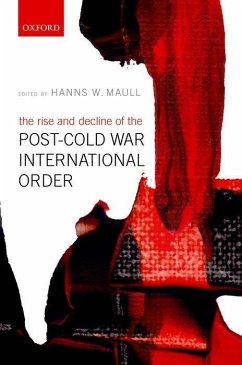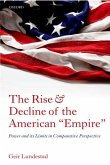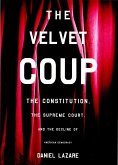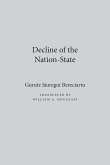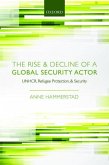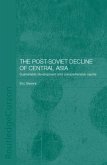The Rise and Decline of the Post-Cold War International Order
Herausgeber: Maull, Hanns W
Schade – dieser Artikel ist leider ausverkauft. Sobald wir wissen, ob und wann der Artikel wieder verfügbar ist, informieren wir Sie an dieser Stelle.
The Rise and Decline of the Post-Cold War International Order
Herausgeber: Maull, Hanns W
- Gebundenes Buch
- Merkliste
- Auf die Merkliste
- Bewerten Bewerten
- Teilen
- Produkt teilen
- Produkterinnerung
- Produkterinnerung
This book takes a bird's eye view of what has been happening with the international order over the last quarter century.
Andere Kunden interessierten sich auch für
![The Rise and Decline of the American Empire The Rise and Decline of the American Empire]() Geir LundestadThe Rise and Decline of the American Empire84,99 €
Geir LundestadThe Rise and Decline of the American Empire84,99 €![The Velvet Coup: The Constitution, the Supreme Court, and the Decline of American Democracy The Velvet Coup: The Constitution, the Supreme Court, and the Decline of American Democracy]() Daniel LazareThe Velvet Coup: The Constitution, the Supreme Court, and the Decline of American Democracy20,99 €
Daniel LazareThe Velvet Coup: The Constitution, the Supreme Court, and the Decline of American Democracy20,99 €![The Primal Root-causes of the Decline of the British Empire 1876-1911. An Appeal to His Majesty King George V The Primal Root-causes of the Decline of the British Empire 1876-1911. An Appeal to His Majesty King George V]() Charles William SmithThe Primal Root-causes of the Decline of the British Empire 1876-1911. An Appeal to His Majesty King George V29,99 €
Charles William SmithThe Primal Root-causes of the Decline of the British Empire 1876-1911. An Appeal to His Majesty King George V29,99 €![Decline of the Nation-State Decline of the Nation-State]() Gurutz Jáuregui BereciartuDecline of the Nation-State37,99 €
Gurutz Jáuregui BereciartuDecline of the Nation-State37,99 €![The Rise and Decline of a Global Security Actor The Rise and Decline of a Global Security Actor]() Anne HammerstadThe Rise and Decline of a Global Security Actor150,99 €
Anne HammerstadThe Rise and Decline of a Global Security Actor150,99 €![The Post-Soviet Decline of Central Asia The Post-Soviet Decline of Central Asia]() Eric W SieversThe Post-Soviet Decline of Central Asia196,99 €
Eric W SieversThe Post-Soviet Decline of Central Asia196,99 €![The Rise and Decline of the American Empire The Rise and Decline of the American Empire]() M. Y. DemeriThe Rise and Decline of the American Empire40,99 €
M. Y. DemeriThe Rise and Decline of the American Empire40,99 €-
-
This book takes a bird's eye view of what has been happening with the international order over the last quarter century.
Produktdetails
- Produktdetails
- Verlag: Oxford University Press
- Seitenzahl: 368
- Erscheinungstermin: 1. Januar 2019
- Englisch
- Abmessung: 242mm x 168mm x 30mm
- Gewicht: 720g
- ISBN-13: 9780198828945
- ISBN-10: 0198828942
- Artikelnr.: 52907064
- Herstellerkennzeichnung
- Libri GmbH
- Europaallee 1
- 36244 Bad Hersfeld
- gpsr@libri.de
- Verlag: Oxford University Press
- Seitenzahl: 368
- Erscheinungstermin: 1. Januar 2019
- Englisch
- Abmessung: 242mm x 168mm x 30mm
- Gewicht: 720g
- ISBN-13: 9780198828945
- ISBN-10: 0198828942
- Artikelnr.: 52907064
- Herstellerkennzeichnung
- Libri GmbH
- Europaallee 1
- 36244 Bad Hersfeld
- gpsr@libri.de
Hanns W. Maull is Senior Distinguished Fellow, German Institute for International and Security Affairs (SWP), Berlin, Senior Policy Fellow for China's Global Role, Mercator Institute for China Studies (MERICS), Berlin and Adjunct Professor of International Relations, Johns Hopkins University SAIS Europe, Bologna. He served on the academic advisory boards of Germany¿s two most important foreign policy think tanks, the German Institute for International Security (as Chairman of the board, 2004 - 2012) and the German Council on Foreign Relations. Hanns W. Maull has authored, co-authored and edited more than four dozen books and contributed widely to academic journals in German, English, French, Italian and Japanese, including Foreign Affairs, International Affairs, Politique Etrangère, Europa Archiv, and Chuo Koron.
* Introduction: The International Order: A Framework for Analysis
* Part One: Functional Partial Orders (International Regimes)
* 1: Bernard Hoekman: The International Trade Order: Performance and
Challenges
* 2: Joyeeta Gupta: Climate Change and the Future of International
Order
* 3: Iris Hunger: Coping with Public Health Emergencies of
International Concern
* 4: William Walker: The International Nuclear Order After the Cold
War: Enduring Strengths, Recent Setbacks, Persistent Challenges
* 5: Myriam Dunn Cavelty: Aligning State and Non-State Actors' Security
Needs for Order in Cyberspace
* Part Two: Regional Orders
* 6: Wolfgang Richter: The European Peace and Security Order at Risk
* 7: Volker Perthes and Hanns W. Maull: The Middle Eastern Regional
Order
* 8: Charles E. Morrison: East Asia's Evolving Regional Order and its
Global Implications
* 9: Chaesung Chun: Regional Order in East Asia
* Part Three: 'Ordering Powers'
* 10: Daniel Deudney: Hegemonic Disarray - American Internationalisms
and World Disorder
* 11: Marco Overhaus: The United States and Regional Security Orders in
the Middle East, East Asia, and Europe
* 12: Zhongying Pang: China and the Struggle Over the Future of
International Order
* 13: Daniel Krahl: The Paris Agreement - China's Kind of
(International) Order?
* Conclusions: The Rise and Decline of the Liberal International Order
* Part One: Functional Partial Orders (International Regimes)
* 1: Bernard Hoekman: The International Trade Order: Performance and
Challenges
* 2: Joyeeta Gupta: Climate Change and the Future of International
Order
* 3: Iris Hunger: Coping with Public Health Emergencies of
International Concern
* 4: William Walker: The International Nuclear Order After the Cold
War: Enduring Strengths, Recent Setbacks, Persistent Challenges
* 5: Myriam Dunn Cavelty: Aligning State and Non-State Actors' Security
Needs for Order in Cyberspace
* Part Two: Regional Orders
* 6: Wolfgang Richter: The European Peace and Security Order at Risk
* 7: Volker Perthes and Hanns W. Maull: The Middle Eastern Regional
Order
* 8: Charles E. Morrison: East Asia's Evolving Regional Order and its
Global Implications
* 9: Chaesung Chun: Regional Order in East Asia
* Part Three: 'Ordering Powers'
* 10: Daniel Deudney: Hegemonic Disarray - American Internationalisms
and World Disorder
* 11: Marco Overhaus: The United States and Regional Security Orders in
the Middle East, East Asia, and Europe
* 12: Zhongying Pang: China and the Struggle Over the Future of
International Order
* 13: Daniel Krahl: The Paris Agreement - China's Kind of
(International) Order?
* Conclusions: The Rise and Decline of the Liberal International Order
* Introduction: The International Order: A Framework for Analysis
* Part One: Functional Partial Orders (International Regimes)
* 1: Bernard Hoekman: The International Trade Order: Performance and
Challenges
* 2: Joyeeta Gupta: Climate Change and the Future of International
Order
* 3: Iris Hunger: Coping with Public Health Emergencies of
International Concern
* 4: William Walker: The International Nuclear Order After the Cold
War: Enduring Strengths, Recent Setbacks, Persistent Challenges
* 5: Myriam Dunn Cavelty: Aligning State and Non-State Actors' Security
Needs for Order in Cyberspace
* Part Two: Regional Orders
* 6: Wolfgang Richter: The European Peace and Security Order at Risk
* 7: Volker Perthes and Hanns W. Maull: The Middle Eastern Regional
Order
* 8: Charles E. Morrison: East Asia's Evolving Regional Order and its
Global Implications
* 9: Chaesung Chun: Regional Order in East Asia
* Part Three: 'Ordering Powers'
* 10: Daniel Deudney: Hegemonic Disarray - American Internationalisms
and World Disorder
* 11: Marco Overhaus: The United States and Regional Security Orders in
the Middle East, East Asia, and Europe
* 12: Zhongying Pang: China and the Struggle Over the Future of
International Order
* 13: Daniel Krahl: The Paris Agreement - China's Kind of
(International) Order?
* Conclusions: The Rise and Decline of the Liberal International Order
* Part One: Functional Partial Orders (International Regimes)
* 1: Bernard Hoekman: The International Trade Order: Performance and
Challenges
* 2: Joyeeta Gupta: Climate Change and the Future of International
Order
* 3: Iris Hunger: Coping with Public Health Emergencies of
International Concern
* 4: William Walker: The International Nuclear Order After the Cold
War: Enduring Strengths, Recent Setbacks, Persistent Challenges
* 5: Myriam Dunn Cavelty: Aligning State and Non-State Actors' Security
Needs for Order in Cyberspace
* Part Two: Regional Orders
* 6: Wolfgang Richter: The European Peace and Security Order at Risk
* 7: Volker Perthes and Hanns W. Maull: The Middle Eastern Regional
Order
* 8: Charles E. Morrison: East Asia's Evolving Regional Order and its
Global Implications
* 9: Chaesung Chun: Regional Order in East Asia
* Part Three: 'Ordering Powers'
* 10: Daniel Deudney: Hegemonic Disarray - American Internationalisms
and World Disorder
* 11: Marco Overhaus: The United States and Regional Security Orders in
the Middle East, East Asia, and Europe
* 12: Zhongying Pang: China and the Struggle Over the Future of
International Order
* 13: Daniel Krahl: The Paris Agreement - China's Kind of
(International) Order?
* Conclusions: The Rise and Decline of the Liberal International Order

